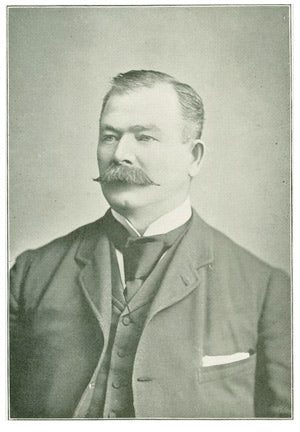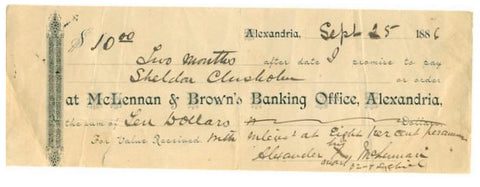
Col. Roderick R. McLennan and George Brown joined forces to form a private banking company in Alexandria, Glengarry County, Ontario in 1885. The two were from very different backgrounds, Brown was a career banker, and Col. Roderick R. McLennan (a.k.a. Big Rory), has been described as a larger than life Victorian gentleman. He was also a world champion athlete, railway contractor, newspaper owner, militia officer, and a politician. His life has been heavily documented, but little has been mentioned about foray into banking.
McLennan’s grandfathers had both emigrated from Scotland and settled in Glengarry. One had fought the Americans in the War of 1812. His father had served with the Glengarry militia during the Rebellion of 1837. Big Rory was born in 1842, at Glen Donald Charlottenburgh Township. Since the early 1860s, he had worked on railway construction in the Maritimes, Minnesota and New York state. |
In 1870 he was with the Intercolonial Railway as a construction foreman, and was to later move to Toronto and establish himself as a railway contractor. He completed many contracts with the CPR in both the Winnipeg area and in the difficult terrain north of Lake Superior. His athletic prowess was as a hammer thrower, and he was a popular draw at the Caledonia- games in the United States, Canada, and the Maritimes. At the Queen’s birthday celebrations in Cornwall in 1865 he defeated the Scottish-games champion, winning a gold medal and $1000 in prize money. His days of throwing ended at Cornwall in an 1877 competition, where after throwing the hammer, it struck a young girl who had wandered into the throwing area. His financial success as a contractor allowed him to purchase the Cornwall Reporter and the Cornwall News, which he merged in April 1886 to form the Cornwall Standard. He also took over the Glengarry Review and Eastern Ontario Advertiser and transformed it into the Glengarrian.
George Brown was born in 1846 in West Goderich, Huron County. George was to marry Maria Samantha McDougall, daughter of Sir William McDougall, the Lieutenant Governor of Rupert’s Land and the North-Western Territory, and a Father of Confederation.[1] He first shows up in a banking role in 1874 as the manager of the Ontario Bank in Mount Forest, Ontario.[2]The Winnipeg branch of the Ontario Bank was opened by Charles Holland in June 1875. The building was owned by Alex. McMicken, and which he had built for his own private banking business.[3] Brown transferred to the Winnipeg branch of the bank in August 1875 as manager and looked after its operations in Portage la Prairie and other towns.[4] Ill health forced him to take a leave of absence in 1882. Such was his popularity that local business people raised $3500 as a token of their appreciation to him for a job well done.[5]
Big Rory was practically a resident of Winnipeg, during his railway contracting days and this is probably where the two men would have met. Big Rory had caught the attention of Sir John A. Macdonald, who had asked him to perform favours for the Conservatives. Politics was something that he was drawn to and he attempted to get into provincial politics unsuccessfully in 1883 and 1886. After his first defeat he moved to Alexandria. McLennan & Brown’s Banking Office was created in an apparent attempt to secure the allegiance of the electorate as their banker. With George Brown’s years of banking experience, the bank was established in August 1885, and at the insistence of Big Rory was promptly sold off to the Union Bank of Canada in November 1886. One biographer suggested that maybe it was meagre returns. The profits of a small private banker could hardly compare to that of a successful railway contractor. Still following the ultimate goal of obtaining the allegiance of the electorate, McLennan continued as an active moneylender, holding promissory notes for several hundred farmers From the time that the bank opened up until 1891 he had out on loan an average of $57,986.21 per annum. The site bill illustrated below informs us that he was getting a return of 8 percent per annum. The election results of the 1892 Dominion election shows that he was getting their vote as well.

Big Rory was a Conservative MP for Glengarry up until his defeat in 1900. He was a business partner of Hugh John Macdonald, Sir John’s son, and involved in a great many business interests. He became president of Cornwall based Eastern District Loans Company, and was a founding director and honorary president of the Farmers Bank of Canada. He died following surgery in 1907, leaving behind a very extensive estate.
George was apparently part of the package as he stayed in Alexandria with the Union Bank as manager until September 1887 when he moved to their Iroquois, Ontario branch.[6] He later lived in Alberta[7] and was to retire to an acreage along the Spallumcheen River near Enderby, British Columbia in September 1911.[8] George Brown died in Enderby May 31st 1919.[9]
Footnotes:
- http://www.veterans.gc.ca/eng/remembrance/memorials/canadian-virtual-war- memorial/detail/1565754
- The Banker’s Almanac for 1874, p.LXXII
- Ten Years in Winnipeg, Winnipeg, 1879 (Winnipeg: Times Print. And Pub. House, p.117
- The Manitoba Historical Society: Ontario Bank; Some Old Winnipeg Buildings by Randy R. Rostecki
- Winnipeg Free Press, May 23, 1882 p.8
- Monetary Times, September 9, 1887
- Enderby Press and Walker’s Weekly, September 7, 1911
- Enderby Press and Walker’s Weekly, November 9, 1911 & June 27, 1912
- Okanagan Commoner, June 4, 1919
References:
Dictionary of Canadian Biography http://www.biographi.ca/en/bio/mclennan_roderick_13E.html
